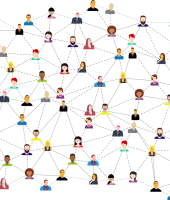Group dynamics
Seminar organized by Jean Decety, 2021-2022 Paris IAS Fellow, as part of the "Social neuroscience" series.
Group living is an adaptive strategy that has evolved independently across many species, from insects to primates. In humans, the functional benefits of group membership notwithstanding, group life is also a source of social strife and destruction. Intergroup dynamics refers to the behavioral and psychological relationship between two or more groups. This includes perceptions, attitudes, opinions, and behaviors towards one’s own group, as well as those towards another group. In some cases, intergroup dynamics is prosocial, positive, and beneficial (for example, when multiple research teams work together to accomplish a task or goal). On the other hand, intergroup dynamics can create conflict in other instances.
With the participation of Laurent Cordonier (sociologist) – Université Paris Cité.
Recommended readings:
- De Dreu, C. K., Greer, L. L., Van Kleef, G. A., Shalvi, S., & Handgraaf, M. J. (2011). Oxytocin promotes human ethnocentrism. Proceedings of the National Academy of Sciences, 108(4), 1262-1266.
- Cikara, M., Van Bavel, J. J., Ingbretsen, Z. A., & Lau, T. (2017). Decoding “us” and “them”: Neural representations of generalized group concepts. Journal of Experimental Psychology: General, 146(5), 621-631.
- Kurzban, R., Tooby, J., & Cosmides, L. (2001). Can race be erased? Coalitional computation and social categorization. Proceedings of the National Academy of Sciences, 98(26), 15387-15392.
|
|
|
Building bridges between social sciences and biological sciences: The scope of social neuroscience 01 April 2022 - 30 June 2022 |
|
|

